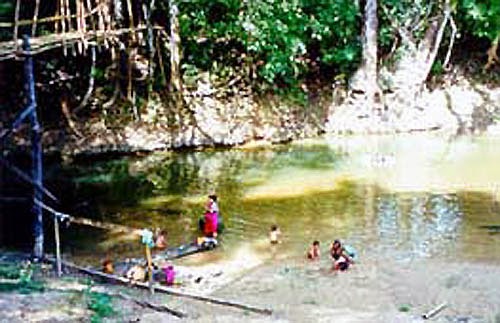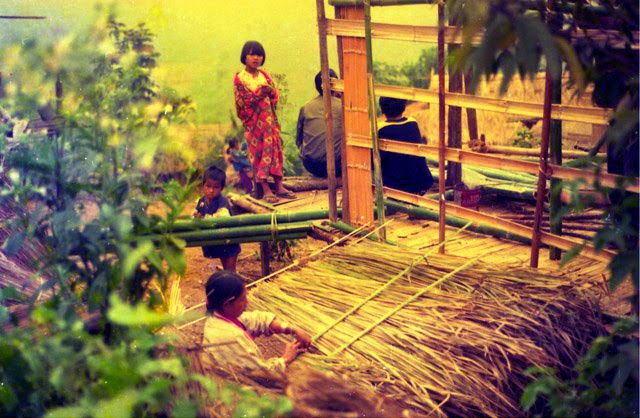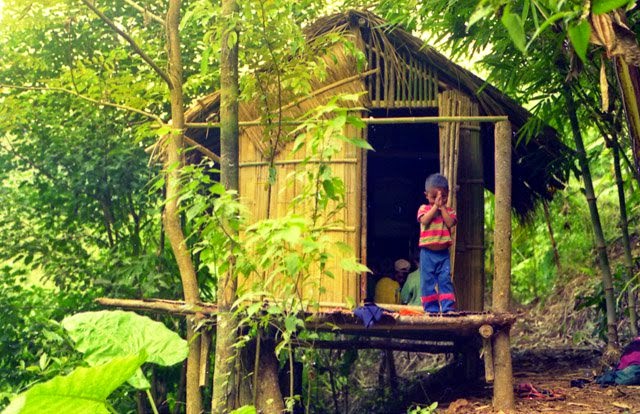 |
| Family visiting an Akha hill tribe village |
Do you know the questions to ask a tour or trekking operator to find out if they are for real or just a ploy to get you to go with them?
First of all, most operators care only about making you happy. They will say yes to what ever you want to do. This is fine if you are doing a normal commercial tour to the handicraft factories or city tour however if you want to visit a hill tribe village or a nature area this is not acceptable. The reason is because that is what the consumer wants and the operators want to meet the needs of their clients, which might not be in the best interest for the environment or local people. This means it is up to you to be well informed about what is and what is not Eco-tourism.Here is a list of subjects and whys that separates the Eco-culture and nature friendly tour and trekking operators from those that are not. It is then up to you to decide which companies properly adhere to the true meaning of Eco-tourism in Thailand.
Tour and Trekking operators first must meet at least the three basic standards to be called Eco tourism.
1. The willingness and ability to maintain or improve the environment.
 |
| Resting at a waterfall |
So what can you do?
Try to find operators that use recycled bamboo rafts when ever possible They pick them up at the take out point and bring them back to the starting point by large truck. The rafts can be used again and again for a year or so. Others just take them to the end of the rafting trip and sell them for other uses or most are disposed of along the bank to rot and they cut fresh bamboo for new ones. Finding these operators will be difficult, as many tour operators will say yes they reuse the rafts when in fact you will find out at the end of your rafting trip they do not. Better yet find an operator that use rubber boats, kayaks or canoes with out gasoline engines if possible.Another major problem is water pollution. With the large numbers of travelers wanting to trek and visit hill tribe villages they are the number 1 source of water pollution in remote areas. I know of many hill tribe villagers that used to go to streams for small fish, frogs and insects to gather and eat. Because of the trekkers using soap and shampoo at waterfalls and in streams the animals that depend on clean water along with the plant life that supports them are now gone. It is a fact that the hill tribe villagers before the tourists arrived used to gather the water and wash their clothes and body away from the streams or waterfalls so as not to pollute.
Many villages now also use the streams to wash in because they know there is nothing left to gather or fish for. They don’t know why everything is gone but it was all-fine before the tourists arrived. They also figure if the well-educated, smart and rich tourists are using the water to bath why should we carry water when we can just do what they do.
 |
| Karen hill tribe children playing in the stream |
Do not bath in streams or waterfalls using chemical soaps and shampoos. There are biodegradable soaps and shampoos made that do not pollute so use these products. Another thing you can do is to carry the water down hill and away from the stream at least 20 meters. The best is not to use soap or shampoo at all while in or near the stream or waterfalls. Bring along a face cloth and add a little soap to clean your body and rinse off far away from the water source.
The people who lived in the rain forest or jungle knew in the past how important their water source was. It is a tragedy that these peoples had to give this up because of tourism. There are still several villages in Thailand that are pristine and still follow these good environmental practices. Their villages are in very remote areas far away from the normal tourist crowds.
These are the two main problems with tourism and the environment in Thailand today. For sure there are many others such as waste disposal that most of us already know about.
2. The ability and the willingness for proper control when visiting ethnic peoples and villages in such a way that they can continue to maintain their natural being, customs, traditions and lifestyle.
 |
| Building a Lahu home |
 |
| Building a wall at Lahu home |
After a year or two here is what happens to this once beautiful village. The once shy villagers rush to
meet the tourists with souvenirs for them to buy. Most of these are made in Burma and not by the villagers themselves. They will not stop bothering people until they buy something and then leave.
 |
| Happy Lahu children |
It is now a year later and the village has no culture to speak of any more. There is no cultural interaction between the villagers and tourists as the visitors are looked upon only as a source of income. The tour operator and guides decide to now leave this village for new villages without tourists and the process starts all over again. Now this village has no more tourists. They have no place to plant crops anymore as the fields they stopped planting have been taken over by nearby villagers. This means they now have to buy food and basic necessities but have no money.
This is a worst-case example but has happened and continues to happen to this day.
 |
| Akha woman giving us free Tamarind |
So what can you do?
Please be careful with trekking operators that advertise new area or village. Find out why they have to go to a new village or area. Most good Eco-culture friendly operators go to the same area and villages year after year. They have an excellent relationship with them so everything is in balance and harmony so they do not need to go to a new area.Most hill tribe villages do not have handicrafts as they spend most of their time working in their fields. There may however be elderly women in the village taking care of young children that do make handicrafts. In this case there will be one home or area where handicrafts can be viewed and bought. No one will bother you to buy anything and you are not looked at as a major source of income.
Make sure you are not allowed to give candy to children or money for pictures. As a matter of fact nothing should be exchanged directly between you and anyone in the village. A village is a very communal place and what belongs to one belongs to all. Jealousy and hate between villagers can arise because one family or person received something from you and they didn’t. It is true that many villages that are visited by tourist drop drastically in population because of jealousy. It is the lucky ones that move away to a different village, usually that of another family member that has already moved because of marriage to a village member.
 |
| Lahu boy greeting us with a Thai "Wai" |
 | |
| Visiting an Akha hill tribe home |
3. The ability and willingness of the tour operator to donate some profits to the people in the villages they visit and in helping protect and improve nature and the environment.
 |
| Planting trees |
The relationship that develops between the operator, guides, local people and communities when the tour or trekking company helps them is very important. This means you as a visitor can enjoy something special and richly rewarding instead feeling like of a source of income. You can develop true friendships with the people you meet and enjoy a spectacular natural unspoiled environment. You and your guide will be well respected by everyone you come in contact with. They also know that some of the money you paid for your holiday to visit them goes to help them and the local environment. They know their customs will be respected and their culture and way of life will remain intact.
 |
| Tour operator giving supplies to villagers |
 |
| Painting a village school |
So what can you do?
Try to find such a tour or trekking operator. The most important thing is being willing to pay more for you tour or trek. The fewer people on the trek or tour the better the experience. This costs more but well worth it. Most guides that work for these Eco- culture friendly operators are very dedicated to helping people including you. They go out and visit these villages and natural areas regularly if they have people to take or not. They have extensive training about the environment, animals, birds, insects and about the local people you will see and meet. They are paid much more than the normal commercial guide and are well worth it so be willing to pay more.Eco-tourism is not cheap so before you go out to find the best price for a trek or tour, first think about who wins and who looses on a cheap tour or trek. No one wins. Think about it.
Written by Randy Gaudet
Founder/Director
All Thailand Experiences
No comments:
Post a Comment